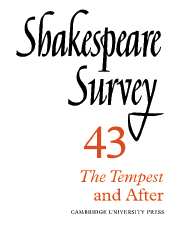Book contents
- Frontmatter
- The Power of Magic: From Endimion to The Tempest
- Reading The Tempest
- The Latter End of Prospero’s Commonwealth
- Henry VIII and the Deconstruction of History
- The Politics of Conscience in All is True (or Henry VIII)
- Shakespeare’s Romantic Innocents and the Misappropriation of the Romance Past: The Case of The Two Noble Kinsmen
- The Hand of John Fletcher in Double Falsehood
- ‘The Duke my Father’s Wrack’: The Innocence of the Restoration Tempest
- ‘Remember/First to Possess his Books’: The Appropriation of The Tempest 1700-1800
- The Tempest and After
- Poetry’s Sea-Changes: T. S. Eliot and The Tempest
- The New Function of Language in Shakespeare’s Pericles: Oath versus ‘Holy Word’
- The Discovery of The Rose Theatre: Some Implications
- The Origins of the Roxana and Messallina Illustrations
- Recycling the Early Histories: ‘The Wars of the Roses’ and ‘The Plantagenets’
- Shakespeare Production in England in 1989
- Professional Shakespeare Productions in the British Isles, January-December 1988
- The Year's Contributions to Shakespeare Studies: 1 Critical Studies
- 2 Shakespeare’s Life, Times, and Stage
- 3 Editions and Textual Studies
- Books Received
- Index
The Politics of Conscience in All is True (or Henry VIII)
Published online by Cambridge University Press: 28 March 2007
- Frontmatter
- The Power of Magic: From Endimion to The Tempest
- Reading The Tempest
- The Latter End of Prospero’s Commonwealth
- Henry VIII and the Deconstruction of History
- The Politics of Conscience in All is True (or Henry VIII)
- Shakespeare’s Romantic Innocents and the Misappropriation of the Romance Past: The Case of The Two Noble Kinsmen
- The Hand of John Fletcher in Double Falsehood
- ‘The Duke my Father’s Wrack’: The Innocence of the Restoration Tempest
- ‘Remember/First to Possess his Books’: The Appropriation of The Tempest 1700-1800
- The Tempest and After
- Poetry’s Sea-Changes: T. S. Eliot and The Tempest
- The New Function of Language in Shakespeare’s Pericles: Oath versus ‘Holy Word’
- The Discovery of The Rose Theatre: Some Implications
- The Origins of the Roxana and Messallina Illustrations
- Recycling the Early Histories: ‘The Wars of the Roses’ and ‘The Plantagenets’
- Shakespeare Production in England in 1989
- Professional Shakespeare Productions in the British Isles, January-December 1988
- The Year's Contributions to Shakespeare Studies: 1 Critical Studies
- 2 Shakespeare’s Life, Times, and Stage
- 3 Editions and Textual Studies
- Books Received
- Index
Summary
Most historians today see the religious changes that took place during the reign of Henry VIII as a series of discrete events that only gradually were understood to constitute a Protestant Reformation. The text that was published in the Shakespeare first folio with the title, The Famous History of the Life of King Henry the Eight, is part of that process of interpretation. Performed first in 1613, it appeared while rumours of a second Spanish Armada were kindling anti-Catholic feeling and a few months after the marriage of the Princess Elizabeth to the Elector Palatine, an alliance intended to strengthen the Protestant cause in Europe. Produced at a time of widespread nationalistic and Protestant fervour, the play interprets events in the reign of Henry VIII as the legitimating origins of Stuart England.
Despite the folio title, the play dramatizes not the life of Henry VIII but a series of individual changes of fortune that taken together chart Henry's emergence as a powerful king. Henry takes no direct part in the first major episode, the Duke of Buckingham's conviction for treason, which seems to be orchestrated by Cardinal Wolsey. Initially, Wolsey also seems to be the source of Katherine of Aragon's problems, intruding between Henry and Katherine as he intrudes between the King and his subjects. Although Henry later traces his doubts about the legitimacy of his marriage to the French ambassador rather than to the Cardinal, he still seems to rely heavily on the judgement of others and possibly to be an unwitting pawn in games of international intrigue. Clearly, his will is frustrated by the power of the ecclesiastical court.
- Type
- Chapter
- Information
- Shakespeare Survey , pp. 59 - 68Publisher: Cambridge University PressPrint publication year: 1991
- 1
- Cited by

